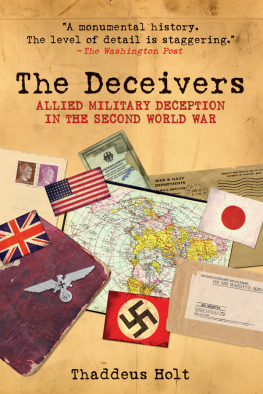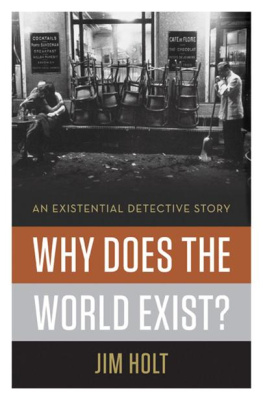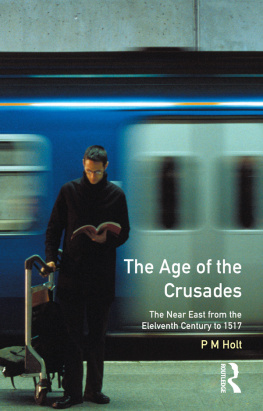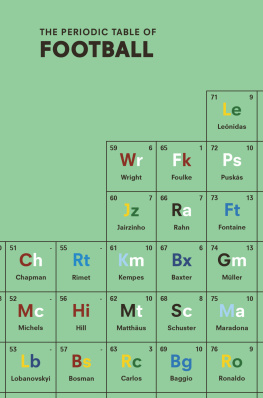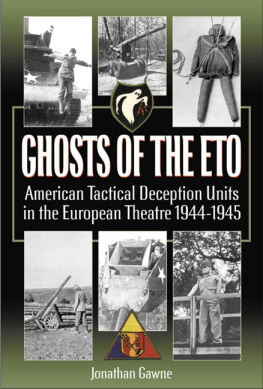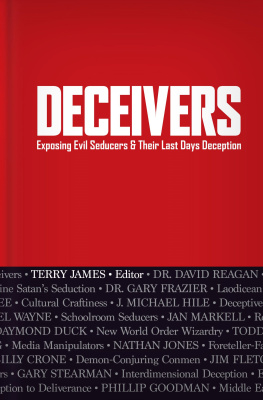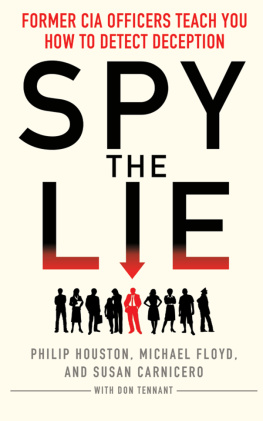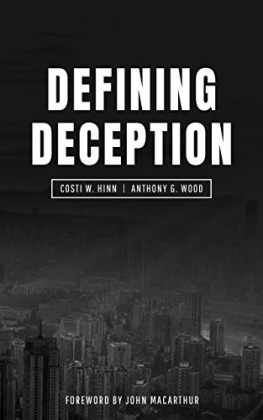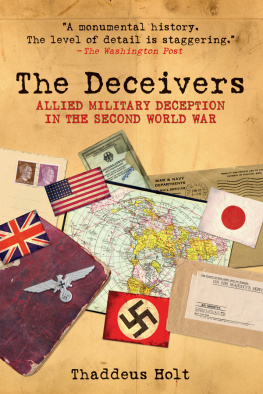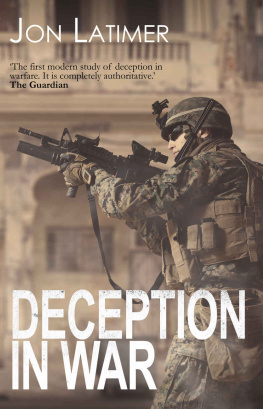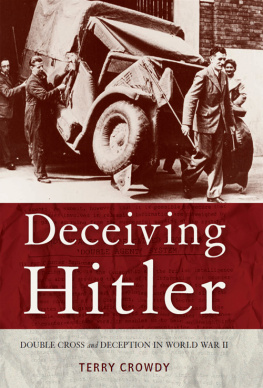PRAISE FOR THE DECEIVERS
Thad Holt has written a brilliant account of Allied military deceptions in World War II. It will become a standard work on military intelligence tactics. And best of all, it reads like a novel!
Joseph S. Nye, Jr., Dean of the Kennedy School of Government, Harvard University
Mr. Holt's history of Allied deception in World War II is definitive. He has trawled through all the documentation, interviewed all the survivors, and put together a history as comprehensive as it is readable and entertaining. It is an astonishing achievement, and no library of the war can afford to be without it.
Professor Sir Michael Howard, author of British Intelligence in the Second World War: Volume 5, Strategic Deception
Just when you have convinced yourself that you have long ago imbibed the last word on the secret side of World War II, along comes Thaddeus Holt and his remarkable study. Superbly researched and full of fresh revelations, The Deceivers is not only immaculately written but wonderfully readable.
Robert Cowley, founding editor of MHQ: The Quarterly Journal of Military History
A highly professional yet entertaining analysis of the dirty tricks ingeniously dreamed up by unscrupulous Allied intelligence personnel in World War II to defeat the enemy. Easily the best book yet written, or ever likely to be, on the subject, drawing on the most recent documents declassified on both sides of the Atlantic.
Nigel West, author of M15, M16 and Seven Spies Who Changed the World
A truly wonderful book! Deeply researched and written with authority and verve, it tells the full story of Allied deception during World War II. The Deceivers not only recounts every major operation, it describes in detail how each operation affected the enemy. It will be essential for the bookshelf of every serious student of World War II.
Ernest May, Charles Warren Professor of History, Harvard University
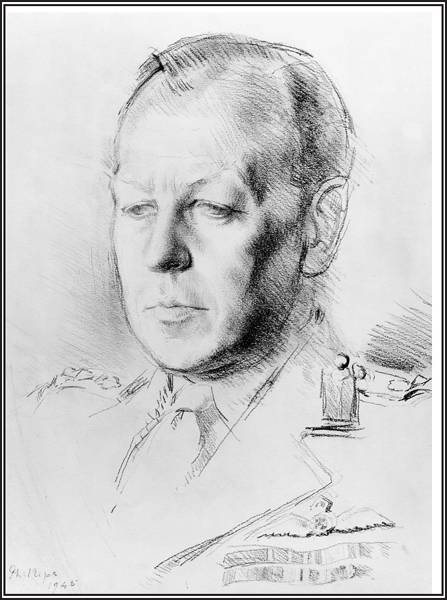
(Imperial War Museum)
Brigadier Dudley W. Clarke, C.B., C.B.E.
The Master of the Game
Copyright 2007 by Thaddeus Holt
All Rights Reserved. No part of this book may be reproduced in any manner without the express written consent of the publisher, except in the case of brief excerpts in critical reviews or articles. All inquiries should be addressed to Skyhorse Publishing, 555 Eighth Avenue, Suite 903, New York, NY 10018.
Skyhorse Publishing books may be purchased in bulk at special discounts for sales promotion, corporate gifts, fund-raising, or educational purposes. Special editions can also be created to specifications. For details, contact the Special Sales Department, Skyhorse Publishing, 555 Eighth Avenue, Suite 903, New York, NY 10018 or info@skyhorsepublishing.com.
www.skyhorsepublishing.com
10 9 8 7 6 5 4 3 2 1
ISBN: 978-1-61608-079-2
Library of Congress Cataloging-in-Publication Data
Holt, Thaddeus.
The deceivers: Allied military deception in the Second World War/Thaddeus Holt.
p. cm.
Originally published: New York: Scribner, c2004.
ISBN-13: 978-1-60239-142-0 (alk. paper)
ISBN-10: 1-60239-142-4 (alk. paper)
1. World War, 1939-1945DeceptionGreat Britain. 2. World War, 1939-1945-Deception-United States. 3. Deception (Military science) I. Title.
D744.H64 2007
940.54'86-dc22
2007015369
Printed in Canada
For W.
Thank you
CONTENTS
ILLUSTRATIONS
Brigadier Dudley W. Clarke, C.B., C.B.E. | FRONTISPIECE |
The Jigsaw Poster | |
John Bevan | |
The London Controlling Section | |
Carl Goldbranson | |
William Baumer | |
Newman Smith | |
Peter Fleming | |
Ormonde Hunter | |
David Strangeways | |
Arne Ekstrom | |
Douglas Fairbanks | |
Harold Burris-Meyer | |
George Train | |
E. P. Schrup | |
Ralph Ingersoll | |
William Harris | |
H. Wentworth Eldredge | |
The Success of FORTITUDE | 568569 |
Eugene Sweeney | |
A Force | |
The Young Ladies Seminary | |
PREFACE
Virgil put it with Roman bluntness and economy. Dolus an virtus, quis in hoste requirat? cried Aeneas's comrade as they fought their way out of burning Troy disguised in Greek armor; which may be loosely translated: It won't matter to the enemy whether you beat him by guile or by valor.
The Western Allies in the Second World War beat their enemies by valor in full measure. But that valor was aided by guile on a level never before seen; the most systematic and skillful deception ever practiced in warfare. This is the story of that guile. In particular, it is the story of the people who practiced it; of the cadre of officers, British and American, who developed and applied that system and that skill. Some were regular soldiers and sailors and security men, but the men of guile, like the men of valor, were mostly plain civilians who had left their peaceful occupations for a time to help their country. They were a cross-section of free citizens: old Etonians and plain Midwesterners, a City of London financier, an international banker, a railroad executive, a gentleman wine-merchant and thriller-writer, a construction contractor, an art dealer, a sociology professor, a film star, a colonial administrator, one of New York's leading journalists, one of the pioneers of stereophonic sound, a world traveler and adventurer; businessmen and schoolmasters and lawyers and Oxford dons. This is their tale.
That tale, particularly its American side, has never been fully told. During the war and for years afterwards the very fact that the Allies engaged in strategic deception at all was a closely-held secret. Portions of the story came out over the years, often in distorted form, often sensationalized. Balance and accuracy were restored, at least for the British side, when Professor Sir Michael Howard's British official history was published in 1990. But only in recent years have important original documents been declassified. And the present author is the first nonofficial historian to have had access to the surviving records of the American Joint Security Control.
Mistakes are inevitable in any work of this length. They should be charged to the author and not to any of the scores of people who so kindly helped him, and without whose aid it could not have been written.
First and foremost are those who shared with the author their first-hand memories, ranging from long interviews, in person or by telephone, to brief notes. They include Mrs. Clarence Beck, Lady Jane Bethell, Desmond Bristow, Anita Burris-Meyer, Alice Crichton, Kenneth M. Crosby, Philip C. Curtis, Arne Ekstrom, Diana Eldredge, Douglas Fairbanks, Mark Felt, Richard D. Fletcher, Stuart Giles, Carl Goldbranson, Jr., Rex Hamer, Christopher Harmer, Sir John Harvey-Jones, Erwin C. Lochmueller, Robert A. Maheu, Lady Maynard, Colonel John R. Nickel, John B. Oakes, Captain Wyman Packard, General Robert Porter, The Countess of Ranfurly, Canon David Strange-ways, Father Eugene J. Sweeney, Will Hill Tankersley, Sir Peter Thorne, W. Ray Wannall, Colonel H. N. H. Wild, and Sir Edgar Williams.

